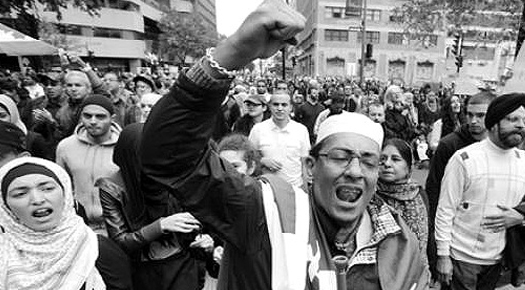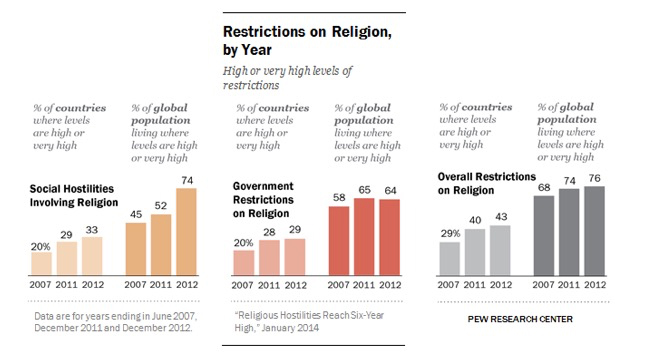
According to a Pew Research Center study for 2012, there were some marked increases in religious hostilities across the globe as compared to the previous six years. Increases in hostility outweighed the decreases, with the top tiers becoming more extreme in most cases. A total of 198 countries were included in the study, the fifth study Pew has done of this kind.
Both governmental regulation and social hostilities were measured in the study. Pew breaks them down this way:
- "The Government Restrictions Index (GRI) measures government laws, policies and actions that restrict religious beliefs and practices. The GRI is comprised of 20 measures of restrictions, including efforts by governments to ban particular faiths, prohibit conversions, limit preaching or give preferential treatment to one or more religious groups.
- “The Social Hostilities Index (SHI) measures acts of religious hostility by private individuals, organizations or groups in society. This includes religion-related armed conflict or terrorism, mob or sectarian violence, harassment over attire for religious reasons or other religion-related intimidation or abuse. The SHI includes 13 measures of social hostilities."
With the exception of the Americas, social religious hostilities increased in every major region, most noticeably in the Middle East and North Africa. One third of the countries studied were found to have high social religious hostilities, a 4 percent increase from 2011.
Government restrictions on religion were barely higher from 2011 to 2012. Twenty-nine percent were found to have high to very high government-imposed restrictions, up 1 percent from the previous year. Europe was the leader in upping the restrictions on religion but the Middle East and North Africa weren't far behind.

With both factors combined, religious restrictions came in at a six-year high of 43 percent. This disturbing trend is further broken down in Pew's study by religion, country, specific groups (religions, mobs, ethnic, sects, etc.), politically-related incidents, and types of conflict (violence, vandalism, harassment, intimidation, discrimination, etc.).
It comes down to this: religious freedom is being threatened from every angle across much of the world, and no group is exempt from some form of harassment or another. Since this study, published a year ago with data from the years before, the world has seen even more intolerance and escalations of disrespect of others, including violence and murder. Governments are encouraging even more restrictions on some groups and are even misleading the public as to the root cause of specific incidents, which favors other groups and can embolden these groups into more mischief. This only serves to create even more hostility and conflict, and it's a gross violation of the human rights of the people.
Photo Credits: Jamaica Gleaner
